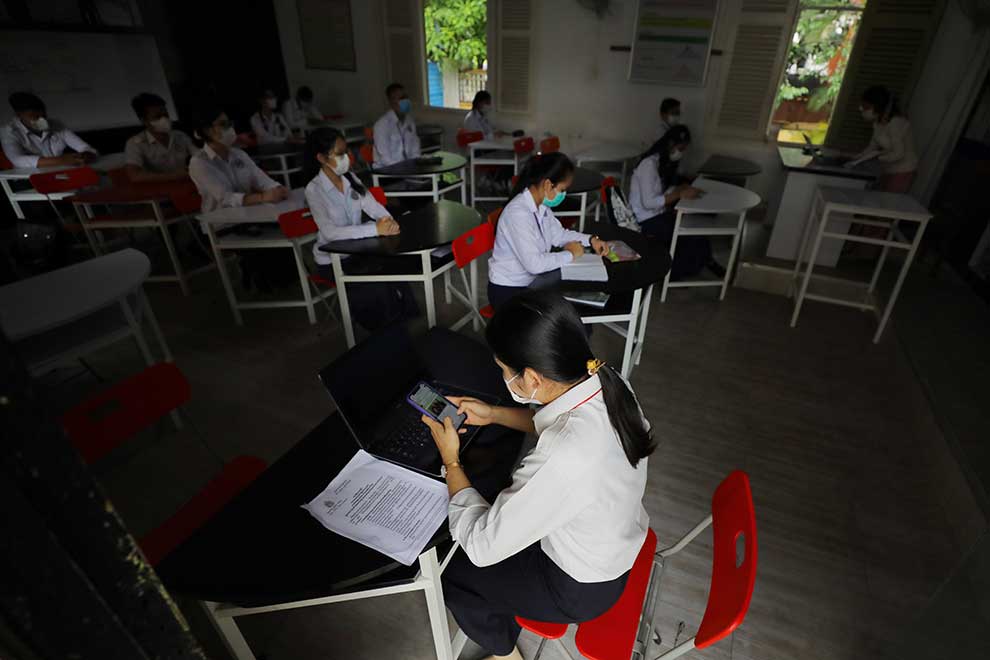
Students using smartphones in their classroom at Preah Sisowath High School in September last year. Hong Menea
Some educational institutions have re-imposed restrictions on the use of smartphones in class after some students were found to be using them inappropriately in violation of their school’s regulations, negatively impacting the quality of classroom education.
The tougher restrictions came about after students at Pich Chenda High School in Battambang province’s Phnom Preuk district had their smartphones taken away by their teachers.
The students were called in individually afterwards over issues such as constantly playing mobile games during classes, watching pornography, making inappropriate videos with their smartphones and also making TikTok videos at school.
Phnom Penh municipal education department director Hem Sinareth told The Post on August 22 that restrictions on the use of smartphones had been disseminated in the ministry’s internal regulations for all schools and permitted them to take action on their use as appropriate to their school’s situation.
Recently, the use of smartphones has become far wider among Cambodian youths, he said, stressing that more stringent internal regulations in each school need to be considered and that it was necessary to pay close attention to students’ activities to make sure they are obeying rules and using their phones appropriately.
Sinareth urged each school to properly manage the use of phones or other smart devices in their classrooms, while overall the use of smartphones as part of the students’ education is still being encouraged.
“Until now, the departments, teachers, and principals are encouraging the use of smartphones to learn online. But they must know how to use them appropriately and at what time they should be used based on teaching hours.
“If some classes do not require the use of mobile phones, then they should not be allowed to use them and they must always be kept in silent mode when not turned off,” he said
Sinareth said that so far he had not received reports from any schools in Phnom Penh regarding serious misconduct by students with the use of smartphones or devices that violated the ministry’s internal regulations, but he will continue monitoring the situation to ensure that students’ phone use is in accordance with the regulations allowed in schools.
Following the Covid-19 outbreak, the Ministry of Education, Youth and Sport made it possible for students to use their smartphones to keep up with their studies through online programmes organised by the ministry and use of the devices was considered essential to the ministry’s distance learning efforts amid the pandemic.
Ministry spokesman Ros Soveacha told The Post on August 22 that the ministry does not ban the use of smartphones or technology that supports student learning or helps with teachers’ teaching, because in the context of Covid-19 the use of these advanced devices was a very important tool for students’ distance learning.
However, he stressed that if students use mobile phones inappropriately and violated their school’s regulations or affected their studies or social dignity by playing games, watching pornography, taking inappropriate videos or other activities such as using too much social media, then the disciplinary councils at each school can impose discipline on the students to correct their mistakes.
“Students who violate the internal regulations of educational institutions must be referred to the disciplinary council to decide on the level of their punishment – be it a reprimand, written warning, temporary suspension of study, expulsion from school or, in the most serious case, a referral to relevant authorities such as the police,” Soveacha said.
On October 22, 2009, the ministry issued a proclamation on internal regulations for public secondary schools aiming to organise public education institutions as safe, secure, orderly, disciplined and ethical places in order to improve their quality and effectiveness in education.
According to Soveacha, the same prakas also stated that students must not watch movies or read books or magazines with pornographic words or images, or engage in any actions that cause danger or cause disorder in the educational institutions.











